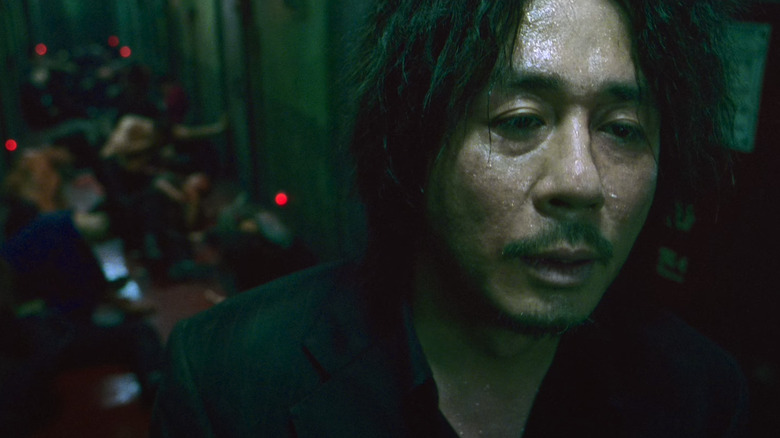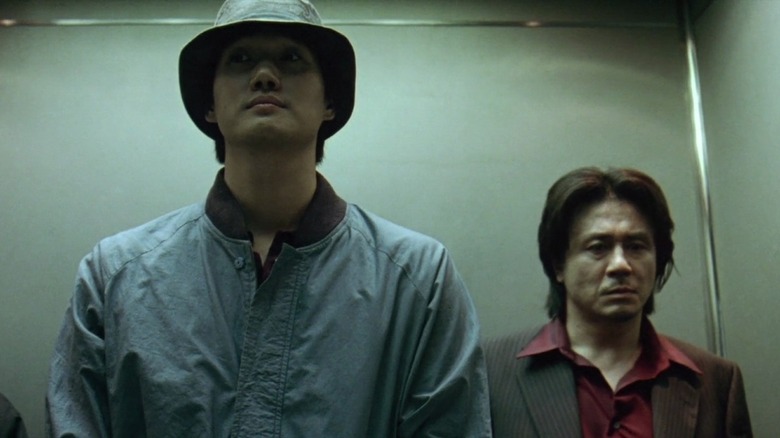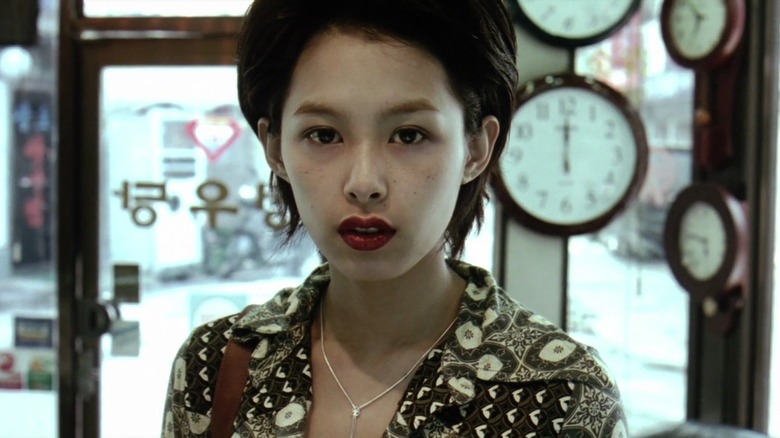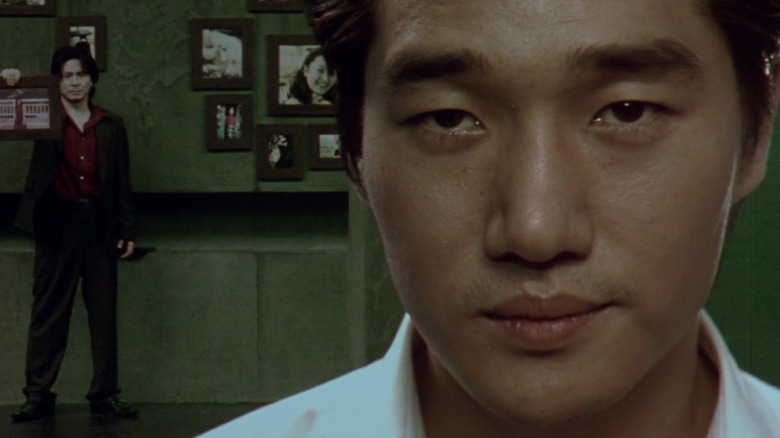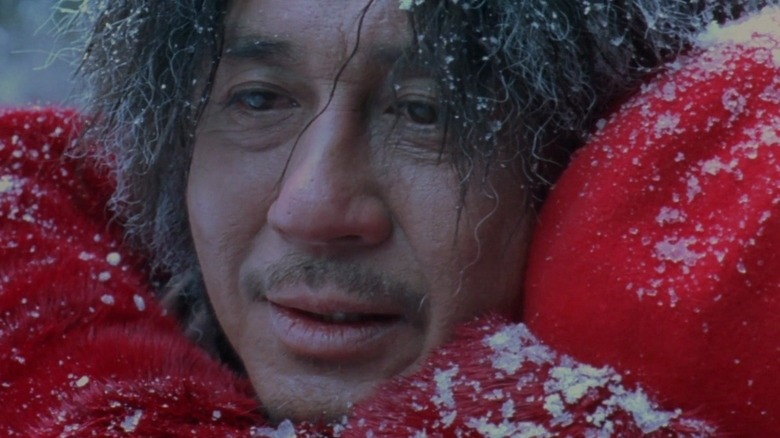Oldboy Ending Explained: Be It A Rock Or A Grain Of Sand, In Water They Sink As The Same
Park Chan-wook's "Oldboy" is a film that goes to some disturbing places. We're not just talking about the infamous scene where protagonist Oh Dae-su (Choi Min-sik) bites the head off a live octopus and scarfs it down raw, its tentacles still wiggling and wrapping around his nose and hand. That's a movie moment rooted in the real culinary tradition of san-nakji, a Korean dish that usually consists of cut octopus pieces served with sesame oil on a plate. They only squirm because their nerves remain active, but watching "Oldboy," the viewer might start squirming right along with them and find their nerves the opposite of calm, too.
The ending of "Oldboy" renders some previous scenes even more discomfiting on a rewatch, as it upends what we know about Oh Dae-su and Mi-do (Kang Hye-jung), the sushi chef who serves him that octopus and takes an immediate liking to him — so much so that she brings him back to her apartment after he collapses at her restaurant counter. Adapted from a manga series by the Japanese writer-and-artist team of Garon Tsuchiya and Nobuaki Minegishi, "Oldboy" is the middle chapter of Park's thematically linked "Vengeance Trilogy," which begins with "Sympathy for Mr. Vengeance" and ends with "Lady Vengeance." This is notably the one entry that doesn't feature the word "vengeance" in the title.
Revenge is certainly a driving force in the plot of "Oldboy," as Oh Dae-su and Mi-do set out to find the person responsible for imprisoning him in a hotel room for 15 years, with his only link to the outside world being a doggie door for meal deliveries. Yet the ending, which we'll be discussing here with full spoilers, puts more focus on living with one's own wrongs instead of taking futile revenge on those who have wronged you.
'Too much wrongdoing'
Before he escapes his hotel cell, goes on a dumpling-tasting tour, and picks up a hammer for an influential, one-take hallway fight, Oh Dae-su is left to rack his brain for who might bear him a grudge big enough to put him in confinement for so long. He makes a list of all the people he's ever offended — and it's longer than he thought it would be. "It was both my prison journal and the autobiography of my evil deeds," he says. "I thought I had lived a normal life, but there was too much wrongdoing."
This invites the viewer to consider their own life, since Oh Dae-su is the main character and we're trained to identify with him. "Oldboy" alludes to Oh Dae-su's womanizing and shows him to be a bad father who misses his daughter's birthday and gets arrested for drunk and disorderly conduct. On the surface, this pales in comparison to the sins of his captor, who is revealed to be Lee Woo-jin (Yoo Ji-tae), a rich man with a personal vendetta against him that goes back to when they were in high school and Oh Dae-su witnessed Lee Woo-jin engaged in an incestuous act with his sister.
Incest is tough subject matter, but while it may add to the overall shocking effect of "Oldboy," it serves the narrative purpose of being taboo across cultures. This enables Park to use it as a kind of universal signifier for something that's wrong, insofar as it's socially unacceptable, if not outright illegal, and can lead to genetic disorders. It attaches a stigma to Lee Woo-jin, who also orchestrates the murder of Oh Dae-su's wife and frames him for it. However, the ending turns the tables and shows that Oh Dae-su has unknowingly committed incest as well.
'An unforgivable sin'
"Oldboy" proffers the quote, "Be it a rock or a grain of sand, in water they sink as the same," which suggests, in the context of the movie, that one form of guilt is the same as another in its power to condemn. By holding Oh Dae-su captive long enough for Mi-do, his own daughter, to grow up, and then programming them for mutual attraction with a post-hypnotic suggestion, Lee Woo-jin forces Oh Dae-su to walk a mile in his shoes. Now, Oh Dae-su likewise bears the shame of incest, and any judgment he might make against Lee Woo-jin is a judgment against himself.
It's a way of making Oh Dae-su reckon with the hypocrisy of human nature: how people are all too quick to find fault in others while turning a blind eye to their own faults. The terrible knowledge of his misdeed — and the fear that Mi-do might find out she, too, has been an unwitting party to incest — leaves Oh Dae-su humbled and truly, violently penitent, willing to abase himself at Lee Woo-jin's feet and ask for mercy. He acknowledges, "I have committed an unforgivable sin against your sister. And I also did you wrong."
Oh Dae-su couldn't have known the ripple effect of his words back in school, that his loose lips and the simple bit of gossip they uttered would destroy the life of Lee Woo-jin's sister, prompting her to commit suicide. In fact, Oh Dae-su does not even remember her or Lee Woo-jin in his initial inventory of people he's wronged. That doesn't change the fact that she became a casualty of his carelessness, the same as if he had caused someone's accidental death. From Lee Woo-jin's perspective, his sister's death is as unjust as the severity of Oh Dae-su's punishment.
Oh Dae-su Rex
Both Oh Dae-su and Lee Woo-jin are fueled by a desire for revenge, and after he carries his out, Lee Woo-jin has nothing left to live for. For his part, Oh Dae-su remains torn between threats of reprisal and a contrition so heavy that it causes him to cut out his own tongue so that it will never wag again.
This unthinkable action is one of several things that aligns "Oldboy" with Greek tragedy, specifically, the Sophocles play "Oedipus Rex" or "Oedipus the King," in which the king of Thebes cuts out his own eyes after learning that he's inadvertently married his mother after killing his father in the fulfillment of a prophecy. While shooting "Thirst," his vampire movie about a Catholic priest, Park gave an interview (via Ikonen) where he said he "named Oh Dae-su in 'Oldboy' to remind the viewer of Oedipus." He described Lee Woo-jin as a "godlike figure" and explained that the yoga pose he strikes is meant to convey the image of the Greek god Apollo.
Lee Woo-jin calls himself an "Oh-Dae-su-ologist," an expert on Oh Dae-su, and by looking and listening in with surveillance photos and bugging devices, he's able to be all-seeing and all-knowing in a way. The hypnotist also has quasi-divine powers in that she can make two people fall in love with each other like the goddess Aphrodite, while Mi-do could be seen as corresponding roughly to Antigone, the daughter of Oedipus, who remains unwavering in her support of him.
No Film School observes in its "Oldboy" discussion that Greek tragedy hinges on cause and effect, a unity of action where one thing leads to another. Like Oedipus, Oh-Dae-su learns the hard way that actions, even those in the distant past, have consequences.
'Life in a bigger prison'
Whether intentional or not, "Oldboy" also manifests a very Catholic sense of guilt, in keeping with Park's religious upbringing, and one can see in it a continuance of the idea of original sin and non-judgmentalism: removing the beam in one's own eye before the speck in someone else's, per Christ's Sermon on the Mount. When Lee Woo-jin turns his back, Oh Dae-su tries one last time to retaliate by activating the remote that is supposed to shut off Lee Woo-jin's pacemaker, but this would-be act of vengeance only amplifies his own sins — literally — as a loudspeaker comes on with a recording of him and Mi-do having sex.
Before he shoots himself, Lee Woo-jin gives Oh Dae-su a second chance at life with Mi-do with the parting words, "My sister and I knew everything but still loved each other. Can you two do the same?" Earlier, he described the world outside Oh Dae-su's hotel cell as "life in a bigger prison," and that's the world we all inhabit.
The real question is whether Oh Dae-su can overcome his guilt and enjoy a twisted sort of happy ending with Mi-do. He started a rumor that snowballed, but the whiteness of the final snowy setting in "Oldboy" hints at the idea of a blank slate. "Even though I'm no better than a beast," Oh Dae-su asks rhetorically, "don't I have the right to live?"
He enlists the hypnotist to do a number on his head again, this time splitting his psyche into two, with only the monstrous half of his dual nature conscious of the incest secret. Park leaves it open to interpretation as to whether the hypnosis really worked as Mi-do reiterates her love for Oh Dae-su, and he smiles, then winces.
